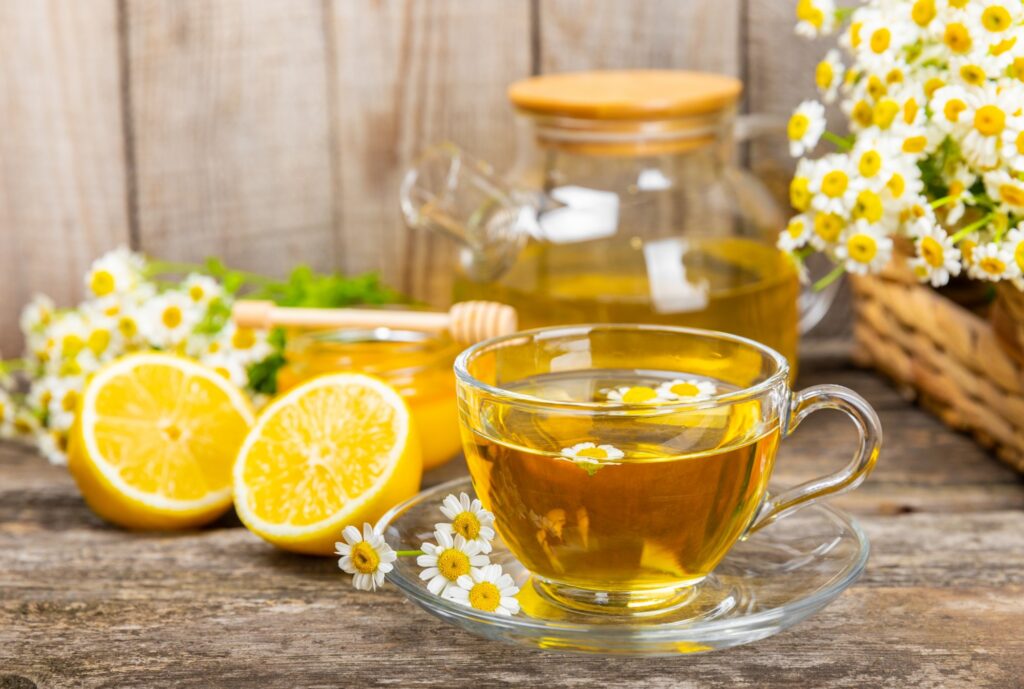
Chamomile tea, a golden elixir steeped in history and tradition, has been cherished for centuries for its distinctive aroma and remarkable therapeutic properties. Derived from the delicate chamomile flower, this herbal infusion has transcended cultural boundaries, becoming a beloved beverage celebrated for its multitude of benefits. In this comprehensive guide, we delve into the extraordinary world of chamomile tea, unveiling its rich history, exploring its numerous health advantages, and providing insights into its preparation and precautions.
Chamomile tea’s allure lies in its gentle, floral essence and its ability to soothe the mind and body. Whether savored as a calming ritual or embraced for its medicinal virtues, this remarkable brew has captivated enthusiasts worldwide, earning a well-deserved place in the pantheon of nature’s finest gifts.
History and origin of chamomile tea
The origins of chamomile tea can be traced back to ancient civilizations, where its healing properties were revered and its cultivation was a cherished tradition. From the sun-drenched fields of ancient Egypt to the verdant meadows of medieval Europe, the chamomile plant has been a constant companion, its golden blossoms adorning landscapes and infusing cultures with its essence.
Historically, chamomile was prized for its versatility, serving as a natural remedy for a myriad of ailments. Ancient Egyptians, Greeks, and Romans recognized its therapeutic potential, incorporating it into their medicinal practices. As knowledge and trade routes expanded, the use of chamomile tea spread across continents, becoming a staple in traditional medicine systems worldwide.
Today, chamomile tea remains a beloved beverage, transcending borders and cultures, offering a harmonious blend of tradition and modern wellness practices.
Health benefits of chamomile tea
Chamomile tea is a veritable treasure trove of health benefits, making it a sought-after beverage for those seeking to enhance their overall well-being. Its remarkable properties stem from its unique phytochemical composition, which includes apigenin, bisabolol, and chamazulene, among others.
Chamomile tea as a natural remedy
For centuries, chamomile tea has been revered as a natural remedy, offering relief for a wide range of ailments. Its soothing properties have made it a go-to choice for alleviating digestive issues, reducing inflammation, and promoting relaxation.
Antioxidant properties of chamomile tea
Chamomile tea is rich in antioxidants, which play a crucial role in combating oxidative stress and protecting the body from the damaging effects of free radicals. These potent compounds help to neutralize harmful molecules, thereby reducing the risk of chronic diseases and promoting overall health.
Anti-inflammatory properties of chamomile tea
Inflammation is a natural response of the body to injury or infection, but chronic inflammation can lead to a host of health issues. Chamomile tea possesses remarkable anti-inflammatory properties, making it a valuable ally in managing conditions such as arthritis, eczema, and even certain types of cancer.
Skin benefits of chamomile tea
Beyond its internal benefits, chamomile tea has also gained recognition for its topical applications. Its soothing and anti-inflammatory properties make it an excellent choice for promoting healthy skin. Chamomile tea can be used as a gentle facial toner, a soothing compress for irritated skin, or even as an ingredient in homemade skincare products.
Digestive benefits of chamomile tea
Chamomile tea has long been celebrated for its digestive benefits. Its relaxing properties can help alleviate symptoms of indigestion, bloating, and cramping. Additionally, its anti-inflammatory effects may aid in reducing inflammation in the digestive tract, providing relief from conditions like irritable bowel syndrome (IBS) and ulcerative colitis.
Sleep and relaxation benefits of chamomile tea
One of the most well-known benefits of chamomile tea is its ability to promote relaxation and improve sleep quality. Its calming effects on the nervous system can help alleviate anxiety and stress, making it an ideal beverage to unwind after a long day. The mild sedative properties of chamomile tea can also aid in combating insomnia, allowing for a more restful night’s sleep.
How to make chamomile tea at home
Preparing chamomile tea at home is a simple and rewarding process. Here’s how you can create your own soothing cup of chamomile tea:
- Gather the ingredients:
- Dried chamomile flowers (loose or in tea bags)
- Fresh, filtered water
- Optional: Honey, lemon, or other desired flavorings
- Steep the chamomile:
- Bring fresh water to a gentle boil in a kettle or pot.
- For loose chamomile flowers, place 1-2 teaspoons in a tea infuser or directly into a teapot or mug.
- For tea bags, place one bag per cup of water in your desired vessel.
- Pour the hot water over the chamomile, and allow it to steep for 5-7 minutes.
- Customize your tea:
- If desired, add a touch of honey for sweetness or a slice of lemon for a refreshing twist.
- Experiment with other natural flavorings like fresh mint, ginger, or cinnamon to create your own unique blend.
- Enjoy your chamomile tea:
- Once steeped, remove the tea infuser or tea bag.
- Savor the warm, fragrant chamomile tea, taking the time to appreciate its soothing aroma and flavor.
Precautions and side effects of chamomile tea
While chamomile tea is generally considered safe for most individuals, it’s important to be aware of potential precautions and side effects. Here are some key points to keep in mind:
- Allergic reactions: Some individuals may be allergic to chamomile, particularly those with sensitivities to plants in the daisy family. If you experience symptoms like rash, hives, or difficulty breathing, discontinue use and consult a healthcare professional.
- Interactions with medications: Chamomile tea may interact with certain medications, such as blood thinners, sedatives, and medications for diabetes or high blood pressure. Consult with your healthcare provider if you are taking any prescription drugs.
- Pregnancy and breastfeeding: Although chamomile tea has been traditionally used during pregnancy and breastfeeding, it’s best to consult with your healthcare provider before consuming it in large quantities during these times.
- Excessive consumption: While moderate consumption of chamomile tea is generally safe, excessive intake may lead to side effects like nausea, vomiting, or drowsiness.
It’s always advisable to consult with a qualified healthcare professional if you have any concerns or pre-existing medical conditions before incorporating chamomile tea into your routine.
Incorporating chamomile tea into your daily routine
Chamomile tea is a true gift of nature, offering a multitude of benefits that extend far beyond its delightful taste and aroma. By incorporating this remarkable beverage into your daily routine, you can unlock a world of wellness, relaxation, and natural healing.
Whether you seek relief from digestive issues, desire a soothing companion for restful sleep, or crave a natural ally in your quest for radiant skin, chamomile tea stands ready to embrace you with its gentle embrace. Embrace the ancient wisdom and modern science that surrounds this humble yet powerful herb, and embark on a journey of self-care and well-being.






